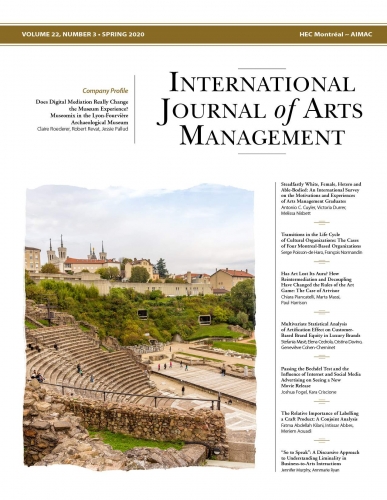“So to Speak”: A Discursive Approach to Understanding Liminality in Business-to-Arts Interactions
Product: Article
$21.00 CA
Jennifer Murphy, Annmarie Ryan
Jennifer Murphy is a graduate of the Kemmy Business School, University of Limerick, Ireland. This article was written as part of her master’s thesis and following her work on an interdisciplinary research project supporting Limerick City’s European Capital of Culture application.
Annmarie Ryan is a lecturer in Marketing at the Kemmy Business School, University of Limerick, Ireland. Her research interests relate to interaction and relationships in business networks and the relations between business and non-profit organizations and cross-sector partnering more generally. She has widely published in top-ranking marketing and organization studies journals, with over 80 journal and conference papers published, including in Human Relations, Marketing Theory, Journal of Marketing Management and International Journal of Nonprofit and Voluntary Sector Marketing.
ABSTRACT
This article explores liminal discourse in the narratives of individuals involved in inter-organizational collaborations (IOCs) between business and the non-profit arts sector in the context of a year-long National City of Culture event. Specifically, it explores identity work in the discourse of business individuals during the early stages of corporate sponsorship of the arts. This identity work is conceived of as involving liminal states, which by their nature can invoke periods of resistance and contestation but can also lead to transformation and new possibilities. Using a case study design, the research employs critical discourse analysis to understand how business managers use language to create and enact identities, and how these identities can be shaped through conversation to allow for new ways of understanding and enacting collaborative business–art relationships. By drawing on the wider social science literature on liminality, and on the inter-organizational collaboration and sponsorship literature more generally, the article provides an alternative framework within which to consider these boundary positions. The inherent fragility that is revealed in these positions points to complexity in the process of sponsorship organization in this context.
KEYWORDS
Liminality, inter-organizational collaborations, corporate sponsorships, identity work
RÉSUMÉ
Cet article explore le discours liminal dans les récits d’individus impliqués dans des collaborations inter-organisationnelles entre entreprises et organisations à but non lucratif du secteur des arts dans le contexte de l’événement tenu sur une année National City of Culture (Ville nationale de la culture). Plus précisément, il examine le travail sur l’identité présent dans le discours des gens d’affaires au cours des premières étapes associées aux commandites des arts par le secteur privé. Ce travail sur l’identité comporte des états liminaux qui, de par leur nature, peuvent entrainer des périodes de résistance et de contestation, mais peuvent aussi mener à des transformations et à de nouvelles possibilités. Dans le cadre d’une étude de cas, cet article propose une analyse critique du discours pour comprendre comment les chefs d’entreprise utilisent le langage pour créer et mettre en œuvre des identités et comment ces identités peuvent être façonnées par la conversation et permettre de nouvelles manières de comprendre et de mettre en œuvre des relations collaboratives arts-affaires. En s’appuyant sur la littérature scientifique sur la liminalité dans le domaine des sciences sociales, ainsi que sur la littérature scientifique sur la collaboration, cet article offre un cadre d’analyse pour examiner ces positions limites. La fragilité inhérente, qui se révèle dans ces positions, laisse entrevoir la complexité du processus d’organisation des commandites dans ce contexte.
MOTS CLÉS
Liminalité, collaborations inter-organisationnelles, commandites par le secteur privé, travail sur l’identité
RESUMEN
En este artículo se lleva a cabo un análisis del discurso liminal en las narraciones de participantes de colaboraciones interorganizacionales (CIO) entre el sector empresarial y el sector artístico sin fines de lucro que se realizaron en el marco del evento Ciudad Nacional de la Cultura, un evento que dura todo el año. Se estudia, en particular, el tratamiento que se le da a la identidad en el discurso de los representantes empresariales en las etapas preliminares de un patrocinio corporativo de las artes. Este trabajo sobre la identidad incluye estados liminales los cuales, por su naturaleza, pueden invocar períodos de resistencia y cuestionamientos, pero pueden también llevar a una trasformación y a nuevas posibilidades. La investigación emplea el estudio de caso para realizar un análisis crítico del discurso con miras a comprender cómo los líderes empresariales utilizan el lenguaje para crear e implantar identidades, y cómo la conversación puede moldear dichas identidades y permitir nuevas formas de entender y establecer relaciones de colaboración entre el medio empresarial y las artes. Inspirándose en las publicaciones de las ciencias sociales sobre la liminalidad, y más en general en la documentación sobre la colaboración y el patrocinio entre organizaciones, el presente artículo ofrece un marco alternativo en el que se pueden estudiar estas posiciones limítrofes. La fragilidad inherente que se revela en ellas apunta a la complejidad del proceso de organización del patrocinio en este contexto.
PALABRAS CLAVE
Liminalidad, colaboraciones interorganizacionales, patrocinios corporativos, trabajo sobre la identidad

